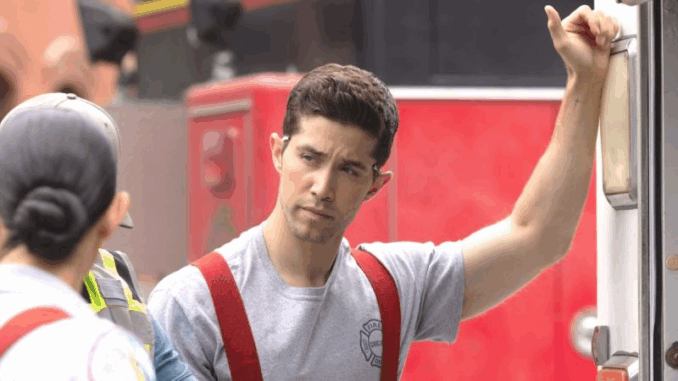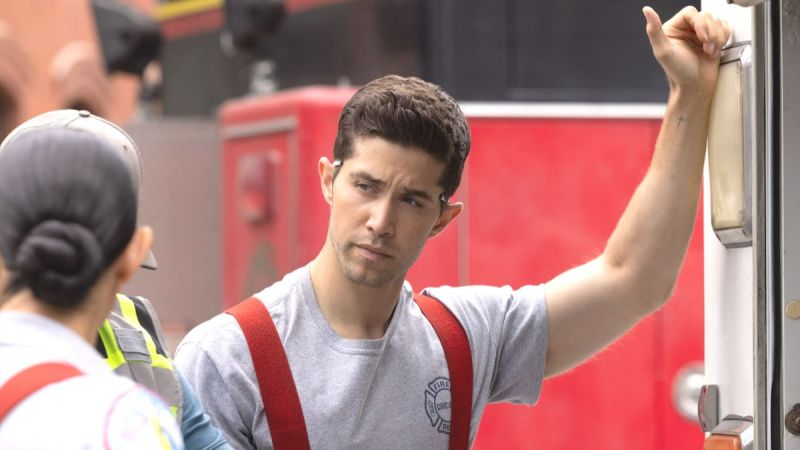
Brandon Larracuente is making a big impression on Chicago Fire. After wowing viewers as rookie police officer Alex Diaz in Wolf Entertainment’s On Call, the actor has joined Firehouse 51 as Sal Vasquez, the firefighter with a difficult past. Audiences are starting to learn just how much baggage Sal carries—and how far he’ll go to try and overcome it.
In an interview with TVBrittanyF.com, Brandon spoke about making the move from one Wolf Entertainment-produced series to another, and how his experience in On Call has helped him on Chicago Fire. He also gave his assessment of the already polarizing Sal and the challenges his character faces. Plus, he discussed what he’s learned about firefighters from his work on the NBC drama.
Brittany Frederick: You joined Chicago Fire after playing a police officer in On Call, and before that you were a doctor in The Good Doctor. Is it fun to basically have portrayed everything people want to be when they grow up?
Brandon Larracuente: It’s been a real treat. I get to step into the shoes of these real life superheroes—people who actually do public services. To be able to step into it and see a glimpse of what they must go through, it’s an honor that I don’t take lightly.
On Call was also a Wolf Entertainment series. How much of that experience is applicable here, when you’re moving to another show produced by the same company, but it’s a very different project in terms of tone and style?
What’s nice is, as the season progresses, we start to discover that Sal actually has a past of being somewhat involved in the police academy. So it’s cool because I get to kind of incorporate all of the tools that I learned at On Call, and kind of bring a smidgen of that into this new project.
What was that conversation like? To obviously be sad that one show is ending, but the people involved saw something in you that they wanted to bring to another project?
It’s a huge blessing that I recognize. It was an honor. I don’t take it lightly. I understand that the Wolf family, they truly are family. The way that they conduct themselves, professionally and whatnot, it feels more than just like a workplace. Most of the people there have been working there for years, so they really made me feel welcome.
They pitched me the idea of joining the show, and [Chicago Fire showrunner] Andrea [Newman] had really great ideas for this character. And like you said, tonally, the show is much different than On Call. But nonetheless, I feel like there was so much to sink my teeth into, just based off of what she pitched me about Sal. So it was an honor to work with people who I like. It was a blessing, and I’m so grateful for the opportunity.
The two characters feel like polar opposites. There was an earnestness to Alex Diaz that worked for On Call, whereas Sal Vasquez is very guarded and already causing tension on Chicago Fire. But particularly in Episode 3, fans are seeing his vulnerabilities. What’s your read on Sal? How do you perceive him?
It’s the old phrase, right? Never judge a book by its cover. On the outside, sure, Sal does appear and come across as an overly confident-type person, but I feel like it’s a wall. It’s a defense mechanism that he has for what’s really going on internally. What’s nice about this season is that Andrea and the rest of the writers have done a really good job at just little by little—because we have a whole runway of 20-plus episodes to do so—slowly unraveling each layer of Sal as each episode progresses. I’m excited to see what audience members think about him as you start to learn more about him [and] his family past.
My wife and I were watching, and she even said, I don’t know if I like this Sal guy. And I’m like, what? She’s like, I don’t know. He’s holding too much close to the chest.
Is that different for you, to play a character who’s gotten this kind of reception? Because neither Alex in On Call or Danny in The Good Doctor were as closed off as Sal is.
For sure, and that’s something that we work with… Prior to me joining this show, Andrea and the rest of the writers, we sat down, and she really kind of pitched me the whole backstory and vision for Vasquez. I kind of gave my two cents on it, and it was a true collaboration. I feel like everything so far that we’ve seen has been really methodical, and they want to make sure that each layer to Vasquez is really thought out that way. There’s something to build on each episode.
There’s 13 seasons of canon that have happened before you. How much information did you want going into your first episode, whether it was for the character or just for you as an actor to feel prepared?
Because my character is new to the firehouse, I actually purposely chose not to watch the show. Because if I watch the show, I start to categorize these characters, and I start to have preconceived notions of how each character is and who they are, rather than experiencing them for the first time—me as Brandon, but also me as Sal. It worked in my favor. Typically, I would like to do so, especially if I have prior relationships with these characters. But it worked in my favor that I had no idea who these people were, because in reality, I didn’t.
You’re again paired with a very strong, experienced actor in Miranda Rae Mayo. How does working with Miranda compare to the dynamic you had with Troian Bellisario in On Call?
They’re two different women, but at the same time, they’re so similar in the sense that they were so welcoming, and they’re great scene partners, and they’re so giving. I got really lucky. I got really, really lucky to work with Troian, who I love dearly, who just showed up every day for me, and she was so just prepared and ready to dive into whatever each episode entailed.
And same thing for Miranda. They both really welcomed me with open arms, and it kind of helps the work. I think whatever happens behind the scenes and those relationships and how you build them, I feel like that translates to the on-screen performances. So I’m very lucky to both work with Miranda and Troian.
On Call was mostly centered on your and Troian’s characters, whereas Chicago Fire is much more of an ensemble series. Is there anyone else you’d love to see how Sal interacts with?
You saw a touch of it with Severide’s character—Vasquez kind of intercedes during their conversation. But I would like to see how that progresses also with Mouch as well. Because I feel like Mouch is wise beyond everybody else at the firehouse, just the way he conducts himself. I think it’s always nice when you see a new character in a show integrate among the other members. So we’ll see that this season, I promise you.
Has there been a particular highlight for you so far?
Episode 4 is a really good one for my character and one of the other characters in the show. We kind of butt heads. I’m not gonna say who it is, but there’s a reason for why we butt heads and so once again, as that episode progresses, you start to see the reason for my actions. That’s all I can really say, but it’s a great episode.
What has this process been like for you as an actor? Not only in terms of the creative process, but the physical demands of Chicago Fire, which has already thrown Vasquez into some big fire scenes?
Every single day that I get home after we do an incident scene that involves fire, and we have to wear the bunker gear, I come home wrecked, because you’re sweating profusely so much. Most of the fires that we do in the show are practical. They’re real fires, and our FX team does an incredible job at setting that up and making sure that we’re all safe.
But it just gives me more insight to what these actual, real life firefighters have to go through every single day. How they have to muster the strength just to be able to put out a fire. It makes me think about the fires that happened in LA, that were continuous for days on end, and how exhausted they might have been. I’m working for maybe eight, maybe ten hours a day, and I’m wrecked. I can’t imagine them.
What have you learned about yourself as an actor in these last two roles? Because between On Call and Chicago Fire, as you said, you have a lot to sink your teeth into.
I think with every project—and I learned this from Javier Bardem in an interview that I watched with him years ago. At the time, I was contemplating going into therapy just to learn more about myself, and he said something really profound. He said, how can you understand these characters that you’re playing if you can’t even understand yourself?
So I feel like going [to] weekly therapy, in conjunction with just wanting to learn more about other people, has really helped me understand these characters that I’m playing. They’re so different, and you have to make them feel different, otherwise you’re just saying words, but you’re not really giving justice to the character behind the words. I try to always stay curious and always find something new to discover about these characters. And I feel like that all translates to what you guys see on screen.
I was encouraged by one of our last directors—Eriq La Salle for On Call. Prior to me and Troian stepping into the roles of Traci and Diaz, he was like, I want you guys to do journaling about your backstory. He’s like, half of the stuff that you’ll write, you’ll never say, you’ll never speak, but at least you have motive for why he’s acting this way, or where he comes from, and that all is important. That doesn’t work for every actor. I know some actors who don’t do that, but for me, it’s worked so far.
What’s one thing you want viewers to know from your experience on Chicago Fire so far?
The one question I get asked a lot—and it’s just worth repeating, because I truly mean it—is what’s the dynamic off-screen? You go 14 years of a show, you have to at some point become a family. These people, they’re really tight-knit, and I was nervous coming onto the show. The analogy I like to use is, it’s like jumping onto a moving train. You’re just kind of trying to find your footing in the process.
But they were so great at integrating me into the group. And I think within maybe less than a week, I felt like one of them, which eased any anxiety I might have had about performing and wanting to do my best work. They were all equally a part of that. So I’m super-grateful to the cast.
